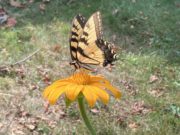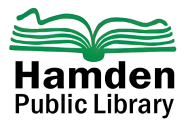
Plant for the pollinators this winter!
[updated january 2023]
As we have done for the past two Januaries, the Seed Library at Hamden Public Library is distributing seeds of plants that boost the work of our dwindling pollinators. Many of these plants are native either to the Northeast or to Connecticut; others are known to attract pollinators such as bees and butterflies.
Throughout the month of January, we offer you the opportunity to select up to three types of seeds to start — outdoors — now, in the depths of winter, using a process called winter sowing. See below for a link to resources so you can participate in this program.
Many seeds of native plants require a certain amount of time in moist, cold conditions in order to break dormancy and sprout in spring. To simulate this process, seeds are set out in mini greenhouses during winter and, hopefully, start to sprout at the right time in early spring. This process is fairly simple and inexpensive, but requires a bit of patience to grow plants of a size that can be placed in your garden. Depending on the species, the seedlings that result may be able to be planted right out into the garden or may need more time to grow to garden size.
Here are the how-to materials and resources on starting seeds in winter. These resources have been provided also to folks who attended our popular online and in-person workshops presented by Peabody Museum Educator Jim Sirch.
We are especially delighted that more of our neighbors are generously sharing their native-seed bounty with the Seed Library and thus to you.
Why natives?
Growing native plants is gaining more and more adherents — and growing more in importance — as people see the results of our open spaces and gardens being overrun by invasive plants that crowd out the beneficial plants in our environment. The work of Doug Tallemy, for instance, calls for people to rethink their landscape and to create native habitat on any size piece of land (or in containers) and to reduce the area that is dedicated to lawns,. The benefits to wildlife and to water quality is enormous as fewer pesticides are needed to maintain this type of planting.
Note: Our veggie, herb, and flower seeds will be available for browsing and self-service during February through mid-June on the lower level of Miller Library..
Hamden Public Library’s Seed Library
The number of people who are trying their hand at gardening is increasing every year. Whether it is to improve the health of our planet by encouraging pollinator insects, or to grow food for your table, we at Hamden Public Library are ready to support your efforts by collecting and distributing seeds that are suitable for our local environment.
The Hamden Library Seed Library project has a two-fold focus:
We will collect, store, and distribute locally-collected seeds of native (and some non-native) plants of importance to pollinators, to enhance the availability of locally-adapted seeds
We will share flower, herb, and vegetable seeds for the home gardener, promote gardening for all, and provide how-to workshops to inspire and engage.
As we are able, we will provide materials for the projects we promote.
Send an email to HPLSeedLibrary@gmail.com to get on the Seed Library mailing list.
